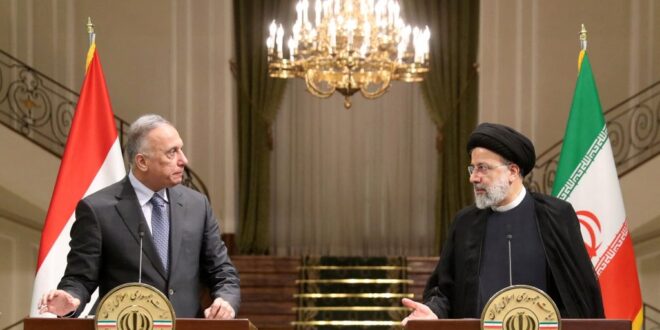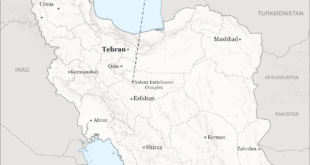On July 25, the Atlantic Council’s Iraq Initiative and Future of Iran Initiative hosted a virtual event titled “Iran and Iraq: The struggle for tenable relations.” Moderated by Masoud Mostajabi, associate director of Middle East Programs at the Atlantic Council, the discussion analyzed the political, economic, and cultural ties and irritants between Iran and Iraq. The event included an introduction by Barbara Slavin, director of the Future of Iran Initiative at the Atlantic Council, and featured a panel including Abbas Kadhim, director of the Iraq Initiative at the Atlantic Council; Mohsen Milani, executive director of Center for Strategic & Diplomatic Studies and professor of politics at University of South Florida; Randa Slim, senior fellow and director of Conflict Resolution and Track II Dialogues Program at the Middle East Institute; and Ahmed Tabaqchali, nonresident senior fellow at the Atlantic Council.
Current status of Iran-Iraq relations
There are many dynamics at play that demonstrate the strengths and weaknesses of the Iran-Iraq relationship. Milani and Kadhim asserted that relations are the strongest they have been since the creation of the modern Iraqi state in the 1920s. Kadhim described the religious exchanges and lack of visa requirements between the two countries as evidence of positive political, economic, and cultural ties. Milani noted Iran’s important support of Iraq against ISIS. Milani and Slim underscored Iran’s overriding goal of preventing Iraq from becoming hostile to Iran as during the 1980-88 war. They asserted that while Iran is more influential than it has been as a result of the US overthrow of Saddam Hussein in 2003, Iran does not always dictate Iraqi policy even as it supports Tehran-friendly governments from a Shia-dominated bloc. Slim and Milani said Iran is worried about growing fractures within the Iraqi Shia bloc which could undercut Iran’s influence. Slim said the death of Quds Force commander Qassem Soleimani and Iraqi Popular Mobilization Forces leader Abu Mahdi al-Muhandis, who were assassinated by the US in 2020, had reduced coordination among the various militias.
Trade relations between the two countries remain lopsided. Tabaqchali noted that Iranian exports to Iraq exceed $8 billion a year while Iraqi exports to Iran are only $1 billion. Rather than seeing this discrepancy as a sign of Iranian dominance, Tabaqchali believes this data demonstrates the lack of diversification and the unsustainable structure of the Iraqi economy. “What would Iran import from us?” asked Tabaqchali, since Iraq does not produce much except oil, which Iran already has in abundance.
Both Iran and Iraq face domestic political turmoil. Iraq still has no new government despite holding elections last October. Milani said the death of Ayatollah Sistani could create a power vacuum among observant Shias.
Regional players in the Iran and Iraq relationship
Kadhim welcomed the improvement in Iraq-Saudi relations but argued that Saudi Arabia did not seek to repair relations with Iraq sooner after the overthrow of Saddam. Slim noted the important role Iraq has played recently in trying to repair ties between Iran and Saudi Arabia, evident in the most recent Baghdad-mediated talks between the two nations. Milani said it is necessary for Iran and Saudi Arabia to address their political disagreements while accepting the fact that the two nations cannot eliminate each other’s influence in the region. Slim agreed with Milani’s analysis but expressed concern that it might be difficult to continue Iraqi mediation between Iran and Saudi Arabia if a new Iraqi prime minister is appointed given the deep trust the Saudis have developed with caretaker Prime Minister Mustafa Al-Kadhimi.
The speakers also addressed the energy relationship between Iraq and Iran. For years, Iraq has relied on Iranian natural gas to keep the lights on, but Iran has rising national demand and an inefficient grid and periodically cuts off gas supplies to Iraq to serve its own people. Iran also suffers from US sanctions. Tabaqchali said both countries needed investment. The Gulf Cooperation Council could help to create a more interconnected power grid to be more flexible to seasonally fluctuating demand. Kadhim emphasized that power grid integration is necessary for regional development, but it should not be politicized, or used as an alternative to self-reliance, and that the focus must remain on developing Iraqi internal capacity.
While many Iraqis resent Iranian intrusion into their affairs, there are also rising complaints about Turkey after the bombing of a tourist resort in the northern Kurdish Regional Government. Tabaqchali said Iraq needs “to put our house in order” so Iran and Turkey cannot continue to “act with impunity” in Iraq. Kadhim said the presence of Turkish forces in Iraq is illegal and advised that Iraq should raise the issue before the United Nations Security Council or the International Criminal Court. Beyond military encroachment, concerns have been raised regarding water security, as Turkey has built several dams that restrict water access to Iraq.
Israel in the Iraq and Iran relations
The panel also addressed Israeli influence in the KRG and the impact of the Abraham Accords. Milani discussed the deep involvement of Iran and Israel in Kurdistan prior to the 1979 Iranian revolution and said that Mossad and the Iranian intelligence organization Savak aided in the establishment of the Kurdish intelligence agency. Iran abandoned the Kurds when it signed the Algiers Accords gaining territorial concessions from Saddam. Slim noted the history of Israel’s connection with minority groups across the Middle East which had been part of its “periphery” strategy prior to peace agreements with Arab states. Milani and Slim said Iran accepted some Turkish and Russian influence in Kurdistan but drew the line at Israel’s involvement. Kadhim asserted that Iraq would not normalize relations with Israel out of fear of public outcry and the current lack of necessity.
Policy Recommendations and outlet for US forces
Within the US context, speakers noted that policy toward Iraq was often an extension of Iran policy. Iraqis face pressure from both the US and Iran in ways that are not always in Iraqi interests. All the speakers said it was important for the US and Iraq to have a multi-faceted relationship that is not dominated by the US desire to contain Iran.
Asked about the small residual US force presence in Iraq, Kadhim said this is not an Iraqi priority at this time. Milani said that US troops in Iraq support an essential balance against both Iran and Turkey. Kadhim stated that US troops will eventually leave Iraq, but the decision must be mutual and involve a transition so Iraq can handle its own security. Milani said that Iran’s strategic goal remains the ejection of US forces but said it was unlikely that the US would end its presence in the Middle East.
 Eurasia Press & News
Eurasia Press & News



